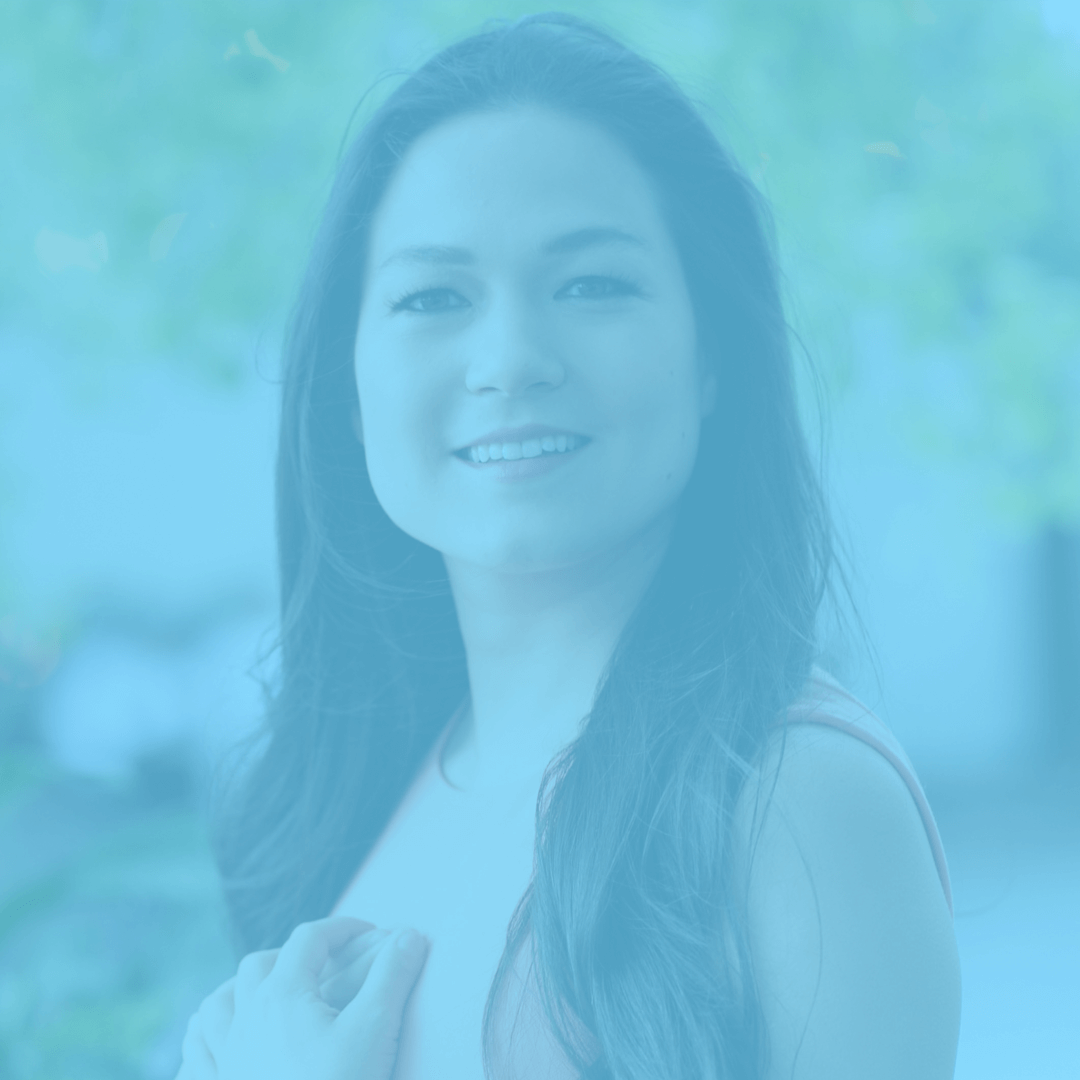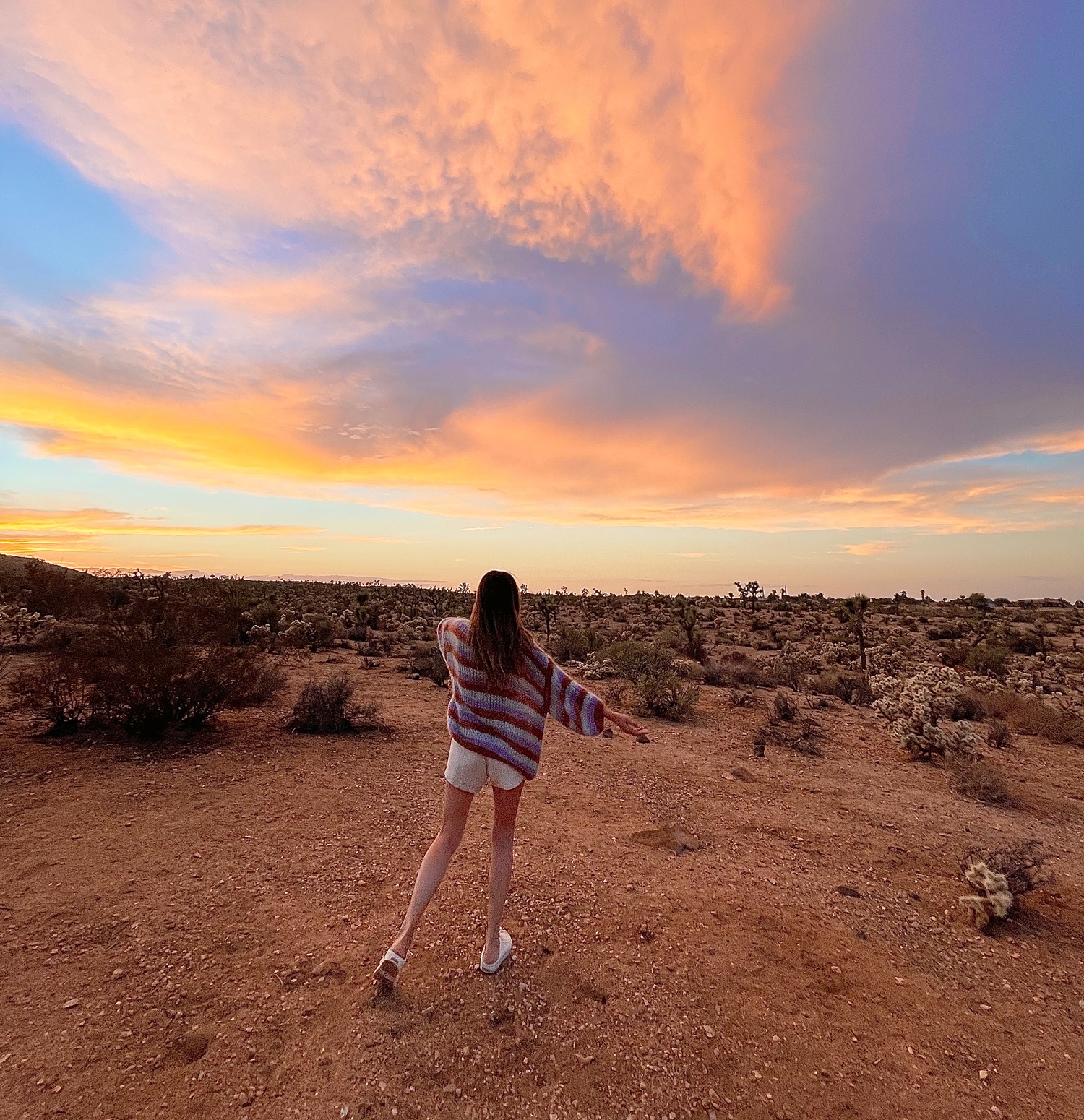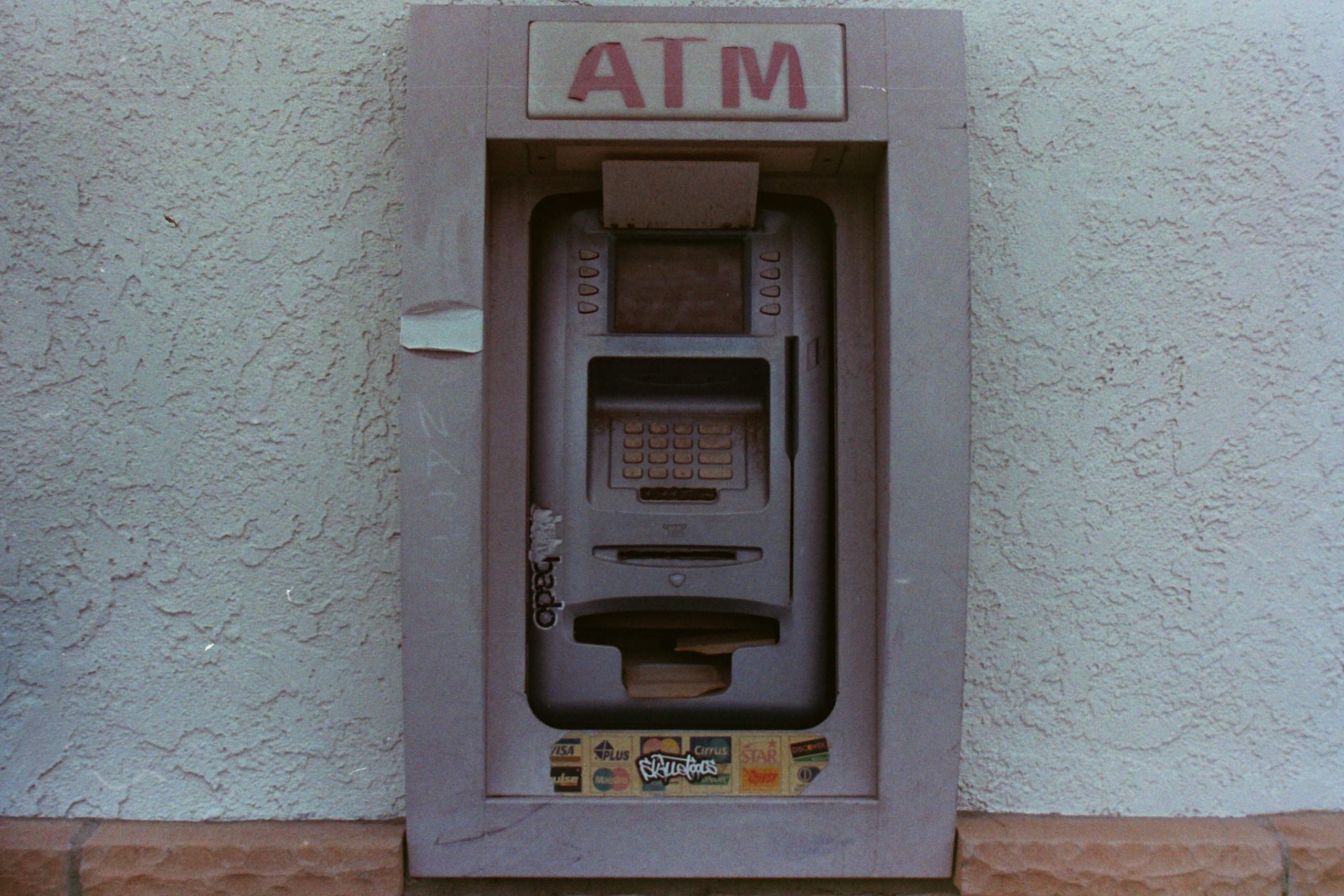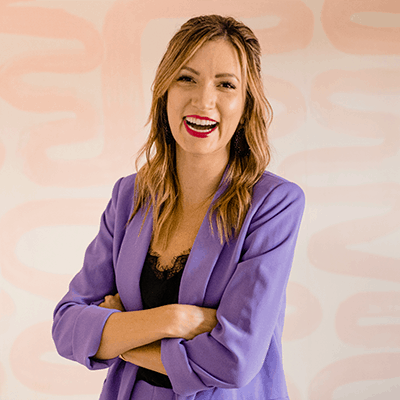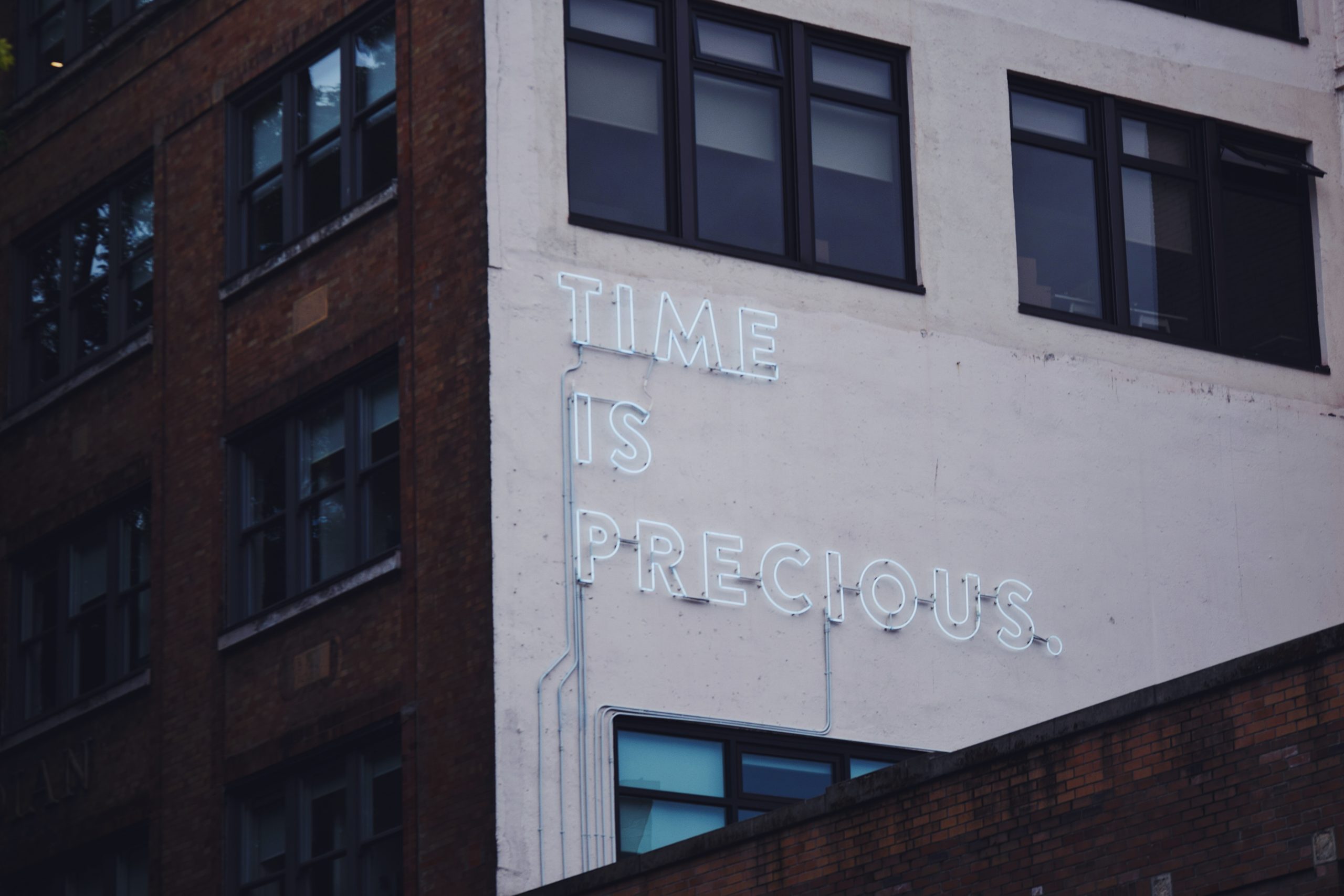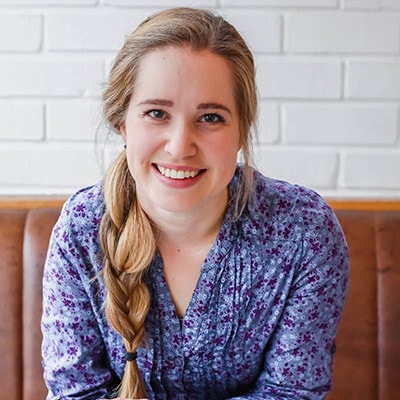How can you use your unique personality and talents as a superpower to get publicity and press, more connections in your industry, and more power to impact millions of people?
First, let’s talk personality types. Are you an introvert or an extrovert?
On the introversion-extroversion scale, I feel like I fall somewhere in the middle of the two options. I used to think that being an introverted entrepreneur would hold me back, and being an extrovert was necessary if I wanted to succeed. Enter my friend, Selena Soo. She completely flipped that fear-based thought on its head for me, and with her quiet power and sensitivity, she’s cultivated a whopping 7-figure business and is on a quest to impact millions of people. Incredible, right?
Selena is brilliant and I know you’re going to l-o-v-e her.
A publicity and marketing strategist for visionary entrepreneurs, experts, and authors, Selena helps her clients and students get featured in big-time media outlets like O, Forbes and Inc., and on popular podcasts and national television.
Ready to learn more from the publicity powerhouse herself?
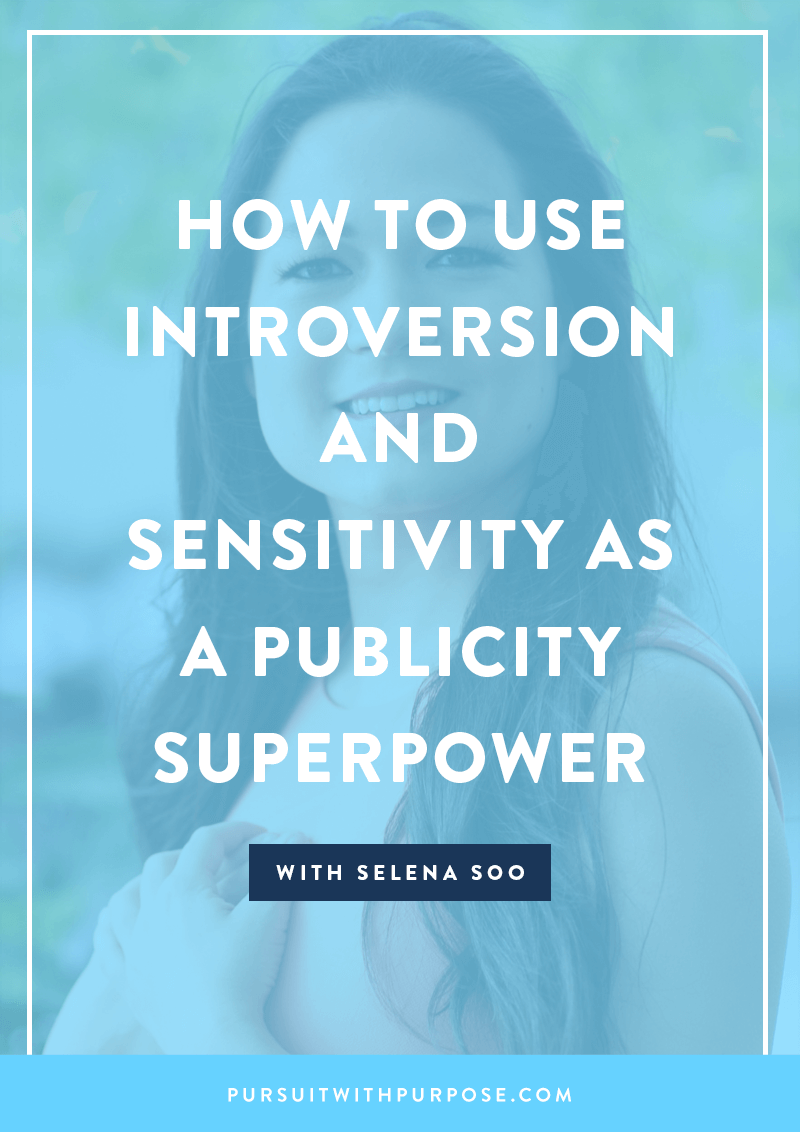
Check out the episode below:
By the way, Selena has a special training series that’s out right now about how to use publicity to become the ultimate expert in your niche or industry. You can sign up for it here! (It’s free). 🙂
Selena is my own publicity coach and whenever she tells me to do something, I DO IT. She’s amazing at what she does, which is why I’m stoked that she put some of her best stuff into this free training series for you. Go sign up, yo!
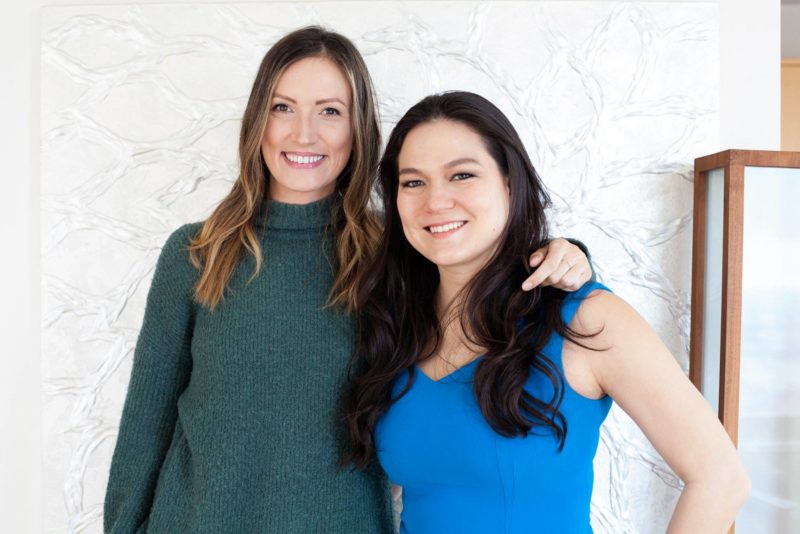
In this episode, you’ll hear about things like…
- How Selena defines “networking”, and how as an introvert, she is well-equipped to connect the dots between people and opportunities.
- What Selena’s “Publicity Pyramid” is all about, and how you can use it as a tool to craft your own successful press plan.
- How you can balance a sensitive personality type while running a highly-successful personal brand.
- The big realizations Selena made to overcome her own fears, and the one big mistake most people are making.
- How to confidently connect with others and add value (without selling something!)
Some Questions I ask Selena…
1. There’s a lot of pressure online to be louder and more “out there”? How do you stay grounded in who you are, while still growing a business in a noisy space?
2. Now that you’re running a 7-figure business, what do you do to get rid of overwhelm as much as possible?
3. Do you have any advice on how to build a lasting relationship with someone influential that you’re meeting for the first time?
Links from the interview:
- Selena’s Website
- Impacting Millions (Selena’s Free 3-Part Video Series on How To Get Publicity)
- Quiet: The Power of Introverts in a World That Can’t Stop Talking, by Susan Cain
- The Fire Starter Sessions, by Danielle LaPorte
What do you think?
I’d love to hear your thoughts on this episode. Are you an introvert or an extrovert? And how does your introvert or extrovert tendency contribute to your overall success?
Here’s how to subscribe + review
Want to be the first to know when new episodes are released? Click here to subscribe in iTunes!
Also, podcast reviews are pretty darn important to iTunes and the more reviews we receive, the more likely we’ll be able to get this podcast and message in front of more people (something about iTunes algorithms?). I’d be extremely grateful if you left a review right here letting me know your favorite part of this episode.
#PursuitWithPurpose
Loving the podcast? I encourage you to use the hashtag #PursuitWithPurpose to show our PWP tribe how you live your purpose everyday. Plus, you’ll get to sift through the hashtag to find other business owners who care about community and connectedness over competition and comparison. And I’ll be reposting some of my favorite images and stories, too. 🙂
Thank you for listening!
Transcript
Read the Interview Transcription HereHey, Pursuit with Purpose family. Now on the introversion-extroversion scale, I feel like I fall somewhere in the middle, right between the two options. I used to naively think that being an introvert as an entrepreneur would hold me back, because going to things like conferences felt draining, and doing a Facebook Live for my audience every day was just not my cup of tea. Basically, I felt like a lot of entrepreneurs that I surrounded myself with, had this big extroverted energy and that this was necessary if I really wanted to succeed. Well, enter my friend, Selena Soo. Selena Soo completely flipped that fear based thought on its head for me, and with her quiet power and sensitivity, she’s been able to create a seven figure business and is on a quest to impact millions. Now Selena Soo is a publicity and marketing strategist for visionary entrepreneurs, experts and authors, who want to reach millions with their message. She’s helped clients and students get featured in places like O, The Oprah Magazine, Forbes and Inc., and land interviews on popular podcasts and national television. Many of Selena’s clients have become industry leaders with seven figure businesses, raving fan bases and hundreds of thousands of followers. I can attest to her skill, I’ve worked with her personally, and she is incredible at connecting with people and helping her clients. Now her signature approach comes down to building powerful and long lasting relationships with influencers and the media, in a thoughtful, authentic way. And that in my eyes is the key to Selena’s success. She truly is thoughtful and authentic in everything she does. Whether you are an introvert or an extrovert, she’ll show you how to use your unique personality and talents as a superpower to get more publicity for your message, more connections in your industry and more power to impact millions of people. Let’s get started.
Melyssa Griffin: Hey, Selena. Welcome to the show.
Selena Soo: Thank you so much for having me.
Melyssa Griffin: So I see your ads all the time on Facebook. You are crushing it over there. In these ads, they’re really captivating to me because they talk about how you used to be more shy and unconfident and introverted, and held back by all of those things. So I’d love to hear a little bit more about the earlier days of Selena Soo before all the success that you’ve had now. What was that like for you?
Selena Soo: Sure. So I would say that I’m still shy and introverted, but I haven’t really let that hold me back. Back in the day, I used to work at a women’s non-profit and I was very comfortable being that behind the scenes person, because my biggest passion has and always will be promoting other people and putting them in the spotlight; people that have got really powerful ideas that could change the world. So that was my background. I went to business school because I knew that there were new opportunities for me. There was just something bigger, I didn’t know what it was. During that time, I met people like Marie Forleo and Ramit Sethi and all these people, and just kind of reached out and offered value to them. I would pay attention to what they were doing, watched their videos, read their newsletters. When I decided one day to start my own business, they really encouraged me and kind of saw me as the go-to person at what I did. Even though I was shy and introverted, and not the natural business owner, it really took other people seeing that potential in me, for me to really take that leap.
Melyssa Griffin: I like that a lot. I like the idea of seeing the potential in other people and how we have that power to do that for others on a daily basis. What you were also saying about basically, like working behind the scenes to help other people with their missions and to get them more media coverage. So it’s like utilizing your unique talents to help other people as well. I thought that was really cool.
Selena Soo: Yeah. It was really great to develop that skill set a non-profit, and to be helping other people and eventually I could transfer those skills into my own business.
Melyssa Griffin: So a lot of the introverts that I know dislike networking. They don’t like going to conferences, don’t like the small talk that it often seems like it involves. What drew you initially to the field of networking and publicity?
Selena Soo: Sure. So when I think of the word networking, my personal definition is, it’s just about helping people. I don’t have like a stigma attached to it. And so for me, I’ve always been drawn to people who are doing incredible things, that are changing the world. And so I would just approach them, I would pay attention to what they’re doing, and because I’m an introvert, I feel like I think deeply and I’m able to connect the dots between people and opportunities. So I feel like networking is something where you can be really creative, it makes you want to feel amazing, add value. For me, the act of giving is the reward in and of itself. So that’s why I like it so much, but there’s aspects of networking that are not as enjoyable for me. I’m very intentional about the kinds of events that I go to. So for me, typically going to like a big conference with 400 people, that’s not really attractive to me. I prefer going to smaller events. I actually prefer hosting my own events. I know that you’ve been to a number of the events that I’ve hosted. What I like about that is that as the event organizer, you have an element of control where you’re setting the mood, deciding who is going to be in the room, and you’re able to show up as that leader. So I feel like by doing networking my way, it’s been a lot easier. This other big idea that’s really helped me a lot is something that Susan Cain said, who wrote the book, “Quiet”, and she talks about when you go to a networking event, your goal should be to just create one amazing relationship with a kindred spirit. So I just think if I just meet one amazing person, the networking event has been a huge success.
Melyssa Griffin: I like that reframe a lot because I think when we go into conferences or at least how I felt at conferences before, is like I need to meet as many people as possible. I need to kind of sell them on who I am so that we can create some sort of bond. It feels like icky. It feels a little transactional and doesn’t feel like it has that same spirit that you’re talking about. So I love the idea of going to smaller events, making it a goal to just create one deeper relationship with people, and to even create your own events, which I know you kill it at. I’ve been to so many of your amazing events. To really have that control over the people who are there, and your time and energy in who you’re interacting with at those events, I think that’s a really cool suggestion. You kind of touched on this in your last answer, but I’m curious. What unique talents do you feel like introverts have in creating a successful business?
Selena Soo: Sure. I feel like when someone is introverted, they tend to listen a lot more than they speak, and they also tend to process things really deeply. I think in business, it’s so important to be intentional and also be really good at putting yourself in the other person’s shoes. And so when you’re someone who’s listening, you’re always thinking about the other person on the receiving end. I think that’s what’s made me really good at publicity, because oftentimes when we’re seeking publicity, it’s about what we want; I want this article, I want this interview, but relationships like that never really work. It’s always about putting yourself in that other person’s shoes. I just assume that all the people that I reach out to are incredibly busy, oftentimes they’re overwhelmed, they don’t have much mental bandwidth. And so, whenever I send an email, I want to make it as easy as possible for someone to say yes, and give them lots of reasons for why this would be an interesting, compelling way to work together. So yeah, with my emails, I don’t just write them, I always stop and think, and like literally think about if I was the person on the receiving end, how would this make me feel and how could I improve this email so that that person would say yes.
Melyssa Griffin: Yeah. It seems like at the core of your philosophy, is always just how can I add value to other people, which is such a different mentality than what I felt like publicity was. So I love learning from you on that topic. You gave an example of like reaching out to someone via email and giving them an idea of how you can add value. What’s an example of how you did that before to connect with somebody that you wanted to connect with and it working out?
Selena Soo: I have a perfect story to share with you, so I’m so glad you asked that question.
Melyssa Griffin: This is not planned.
Selena Soo: Yeah, this wasn’t planned. So this was years ago before I even had a business, maybe six or seven years ago. Danielle LaPorte was coming out with a book called “The Fire Starter Sessions”. I knew she had the book coming out because I’m on her newsletter, I heard her talking about it. I just love her work so much. I thought you know what, I would love to share that with someone at Oprah Magazine. I had a colleague there who worked in the food section and I knew that she could maybe give me an email of the right person to pitch. And so I reached out to Danielle and I said, “I’m so excited about your book. Would it be helpful if I reached out to the book editor at Oprah Magazine? I wanted to just check in with you first,” She was like, “Of course. Let me have my publisher send you a copy of my book.” They also sent along some fire starter tattoos. I just made a big project out of it. I bought this brown paper bag. I put this red fire paper inside the bag. I bought some chocolate fire chili bars just to make it extra special and interesting. I hand delivered it to Hearst Magazines, and then I also wrote a really thoughtful note that I sent to the team at Oprah. Afterwards, I took a picture of the package and the email that I sent and shared it with Danielle LaPorte. She was like, “Selena, this pitch is impeccable. Every single word, the whole spirit of it. You’re so in your genius zone. Thank you.”
And so I guess there’s a couple of big lessons that I want to you to get from that. This is kind of how I live my life, is that I don’t wait for opportunities, I create opportunities. And so there are people around me who inspire me and I’m just—I want to be a part of their world. I want to be helpful, but rather than thinking let me wait until they come to me—and they may not even know who I am, let me come to them with some helpful suggestions. The other thing is that I communicate with people. A lot of times we have our favorite experts, authors, entrepreneurs, and we tell our friends this person is so amazing, but we’re actually not telling that person directly. And so with Danielle, I let her know that I think she’s amazing. I took photos and forwarded the email because I wanted her to understand what I was doing and how I was helping her, and to keep her in the loop. When I started my business, she ended up offering me a testimonial. She let me use a couple sentences from the email she wrote back to me. It wasn’t something that was planned, but by being someone who’s consistently helping people and creating opportunities to help them get ahead in their businesses, I became a go-to person that they were able to share with their audiences.
Melyssa Griffin: And didn’t you just work on an even bigger campaign with her too, for her recent book?
Selena Soo: Yeah. So I helped with her most recent book, “White Hot Truth”. We did a really cool influencer campaign and bulk book strategy, where I got a lot of my friends, and the different coaches and entrepreneurs in my network to buy 100, 500 books. I developed the different levels of what people would get. That again, was like me being able to put myself into someone else’s shoes and think about how someone would like to partner with Danielle, what would be some amazing benefits that she can give to them. It just became such a huge win-win all around.
Melyssa Griffin: I love that story because it’s like you went into it because you love Danielle. You were a subscriber on her newsletter. You weren’t like buddies with her. You weren’t texting her ideas. You were a subscriber on her newsletter in her community and you saw an opportunity for her that you could help her to achieve. I love what you said. You said, “I don’t wait for opportunities, I create opportunities.” I think that is such a marker of a successful entrepreneur, and really just a successful person in general who doesn’t wait around for Danielle LaPorte to knock on your door. You’re like I’ve got an idea and I’m going to send it to her.
Selena Soo: One more story that I want to share, because I really want your listeners to think bigger and think about how they can do this. And so just some high level takeaways are, with all the people that you admire, you may think I have no idea what their priorities are, I’m not a mind reader, but if someone is coming out with a book, there are certain things they’re going to want. They’re going to want publicity. They’re going to want bulk sale. They’re going to want Amazon reviews. If someone’s got a podcast, they want iTunes reviews and potentially introductions to really high profile guests or media coverage. So I think that it’s very possible to figure out what other people need without them telling you. A quick story is, there’s this person, Pat Flynn, he’s the founder of Smart Passive Income, and I’m on his newsletter. In his newsletter, he said, “I’m coming to New York City in October. I might have some time to hang out with Smart Passive Income readers, so let me know if you want to get together.” I saw that email and I thought about how could I add even more value to Pat, because there’s going to be a million people that want to meet up with him. And so I sent him an email and said, “I’m so excited that you’re coming to town. I’m a huge fan. I would love to organize a dinner party on your behalf, in your honor. I’ll invite some of our mutual friends and some other really great people that you would like to know.” I paid for the dinner party and just created a really amazing experience. That’s how we got connected. It’s another example of not waiting for an opportunity, but kind of paying attention to the people you admire and thinking how can I really make their day and do something really special to deepen the relationship and give back.
Melyssa Griffin: It seems like these are things that anybody can do. It’s like finding your unique gifts and then figuring out what does that person need help with or how can you add value to their life. So you threw Pat a party with some people that he probably wanted to meet also, and just added value in this bigger way. How do you—because I feel like a lot of people listening might think they have that voice of self-doubt inside where they’re just unconfident. They’re like this amazing, high profile person doesn’t want to hear from me. How did you get past that to be so confident in reaching out to these people with your ideas?
Selena Soo: Yeah. It’s interesting that you say confident because I’m not thinking going in, I’m so confident, and I’m more thinking like wow I’m so inspired that I just want to be like—I just get excited about the ways that I can contribute to their lives. I also know that for me, I’m not looking to get anything. It’s not like okay I do this nice thing and then I have this list of expectations or these favors I’m ready to ask for in return. For me, like I said before, the act of giving is the reward. It’s meaningful to me and fulfilling to contribute to bettering someone’s life, especially someone who I admire, who’s got a really important message. So that’s kind of where that comes from. It’s because it’s not about me, I know that by supporting them and being a part of their life, it’s only going to make it better versus taking anything away from them.
Melyssa Griffin: Yeah. I like that because it feels like you’re taking the ego out of it, because if you go into it expecting something in return or even just feeling self-doubt like oh I shouldn’t reach out to them because they’re way too big, they won’t pay attention to me, then it’s about you. It’s about your ego, but with you and your strategy, it’s about the other person, which completely removes that need for an ego or just that feeling of self-doubt. So I like that. It’s more about the why behind it, the people that you care about so much you’d want to support them. It’s really cool.
Selena Soo: Yeah. And actually just a couple of ideas to just show that it’s not that complicated when you’re helping out these influencers and people that you care about. It’s not about gifting your services for months and months for free. Like I said before, it could be something as simple as leaving an Amazon review and then sending the influencer a screenshot, or when they’ve got a book come out, instead of buying one copy, buy five copies and have your friends, and you take a picture with the books and post it on social media, or perhaps you’re a graphic designer and you listened to a recent webinar or read an article that was amazing, and you make a couple Instagram or Pinterest images that they could use. Those little things will really stand out. Leaving a comment on a Facebook post I don’t think is powerful enough, like to really form a lasting impression. If you do things that are like connected to their most important goals, whether it’s publicity or sales or their online image, and just do things that are really thoughtful, that like the average person wouldn’t do, then you’ll really stand out.
Melyssa Griffin: Right. I can agree with that too and just how I’ve seen people in my business. We have students who will go into our Facebook group once a year and never comment and then there’s other students who are in there every single day providing feedback and advice to other students. They’re not paid. They’re not like people that I’ve hired. They’re literally just people who have my back and really want to support my community. I see those people, and a lot of the times I end up hiring them to be our Community Managers or people who are on my team. So I feel like—I mean I completely agree, where if you just put in the effort and you try to stand out and be of value and of service to people, they’ll notice you because you’re always there and you’re being consistent with it. It’s not something that you have to pay for. It’s like you could give this free value to their community and really stand out because of it. So in my research about you and just also knowing you as a friend, I saw you mention that you’re a sensitive person, and yet, you’re this really big industry leader in our industry, with a large following. So I’m curious, how do you balance your sensitivity and being a sensitive feeling person with also having a popular brand that you’re the face of?
Selena Soo: Sure. Yeah I feel like a big part of who I am is being a highly sensitive person. I wrote an article about that called “The Confessions of a Highly Sensitive Entrepreneur”. And because of that, it’s been really important to surround myself with the right people because I’m actually very fueled by emotion and by being inspired by other people. And so if someone has a negative energy or is really critical or that kind of thing, I have to make sure to find a way to clear myself of that person. In my life right now, I’m surrounded with such great people. I think that has been a huge part of my success. There’s a famous executive coach, Marshall Goldsmith. He talks about the number one factor to having a successful coaching or consulting business. The number one factor is not how good you are at networking or branding or how hardworking you are, the number one factor is the quality of your clients. And so I’m sure you know Melyssa, that for you, for me, for all of us, we may have people that go through our programs and one person is really killing it and getting incredible results, maybe one person is complaining and there’s always a reason why it’s difficult for them. And so I work really hard to attract the right kinds of people that are really values driven and hardworking, and really put their clients and customers at the forefront. And so I feel like that’s one of the reasons why I’ve been able to be successful, and having those people that inspire me and energize me and who I just love, has allowed me to thrive as a highly sensitive entrepreneur.
Melyssa Griffin: I feel like that’s great advice for every entrepreneur, to surround yourself with amazing people who are doing things that you want to be surrounded by. I think you’re so right. I feel like I’m a pretty sensitive person too and I feel things very deeply also, and being around a negative person just totally depletes my energy for the whole day. It puts me in this weird mood and I just don’t feel like myself. Being around people who I feel are doing things that I love and I’m inspired by, and who are positive people, can completely turn around everything in my life. So it’s so amazing to me how vital relationships are. It seems like that’s almost the core of who you are too, just relationships and creating deep relationships with publicity, with your friends, and using that to fill your life and other people’s life. I think that’s really cool.
Selena Soo: And one thing I want to add to that is, you really want to be conscious of who you’re looking to attract. Who do you want to have as friends? Who do you want to have as clients and customers? What happens a lot in online marketing is there’s a lot of language that is fear driven. They’ll say things like are you constantly feeling overwhelmed, have you tried everything and nothing has ever worked. When you use that language repeatedly, you’re actually attracting low achievers and people who are always in a state of struggle. And so I see the value of kind of using some of these marketing techniques, but I think about like I’m looking to attract high caliber people that also really resonate with success and achievement, and having big dreams and helping people. And so I try to use more of that language in my copy.
Melyssa Griffin: That is a great point. I think I’m probably guilty of using language like that as well in my marketing sometimes. What kind of reframe would you put on that kind of marketing language? What would you say instead to attract the types of positive achieving people you want?
Selena Soo: Yeah. So I really focus on their dreams. And so the people that come to me are people that dream of having a TED talk that reaches a million people or speaking on big stages with kind of other legends in their industry or writing a bestselling book that hits the New York Times bestsellers list. So I’m really clear of what their goals are and I kind of paint the picture. I think that’s what really inspires people. So yeah, I focus more on the dream. I do touch on the areas in which they’re having trouble, but I don’t kind of paint it as like a really terrible picture, because most of the people that come to me have had some level of success. A lot of them consider themselves hidden gems. So these are people that maybe they’ve worked with clients one on one and their clients think that they’re incredible, they think that they’re amazing, they get them great results, but the rest of the world doesn’t know who they are. And so like there’s this opportunity that they can seize to reach more people. So the language is still positive. It recognizes maybe some challenges or roadblocks, but it doesn’t paint them as people that are helpless or who have trouble achieving things in their life.
Melyssa Griffin: Yeah. I love that. That is such a great point and example. So I’m curious, because in the past few years, you’ve grown your business into this seven figure empire. I mean I’d imagine that there’s a lot more work that goes into running a seven figure business than six or five. What do you do now to get rid of those feelings of overwhelm that maybe running such a big company can bring to you?
Selena Soo: Sure. So I would say that I’m a really hard worker. I may feel overwhelmed at times, but I don’t let that stop me. I think a big part of it for me is I have a big vision. I’m really excited about what I’m creating, about the people it’s going to impact. I also know that the challenges are just temporary. I say to myself sometimes, like I know I’m a good person, I want to help people, I’m willing to do the hard work, and I’ve got an amazing network of people that I’ve cultivated around me. So if I can’t do it, then really who could. So I have all the ingredients for success and it’s not that I was given it, it’s because I work hard and I created these resources around me. And so the thing is I just feel like, for everyone, if you’re willing to do the hard work, add tons of values to your clients, and listen to their feedback and course correct, you will be successful no matter what.
Melyssa Griffin: Yeah and the overwhelm is almost just like something that doesn’t even matter because your vision is so clear. So we talked a little bit about this before the interview. I want to talk about what about fears that people have in regards to publicity and being more seen, or people who are afraid of being more visible in their business. Can you talk to anything about that?
Selena Soo: Yeah, absolutely. So I can really relate to this because even though I help other people get into the spotlight, I actually do not naturally gravitate there. I’m not the kind of person who’s running for the microphone and who wants to have the video camera on me. I really prefer being behind the scenes, but then I also pretty quickly realized I want to help and reach a lot of people, and so they need to know who I am. When I was first starting my business about six years ago, one of my clients said to me that she wanted to introduce me to everyone on her email list and to do a Skype video interview. I didn’t have any experience doing that myself and so I was scared, but then there was this part of me that knew that this was a great opportunity and that I should just go for it. And so we did the Skype interview, I remember feeling really nervous. And then she sent me the video back. I was watching it with my interns, and at the time, I was really working on my public speaking because I used to just use so many filler words and I really lacked confidence. And so they were tallying up all the filler words I used, like ums, ahs, you knows. There were literally something like 137 filler words.
Melyssa Griffin: Wow. It must have been painful to do that with your team.
Selena Soo: It was really painful. I was looking at that sheet of paper—and also when I was doing the interview, I just didn’t have experience. I was really bad at maintaining eye contact. I rarely smiled during the interview even though inside I was smiling. I remember just watching and covering my face with my hands and thinking like this is a disaster, this is like a train wreck. Why would I ever want to share this with anyone? And so I told my interns, “I don’t think I want to share this.” One of them said, “You know honestly, I don’t think the interview was that bad. You had some really good advice to share. I think people would really like it.” I kind of got struck by that and it made me realize a couple of things. So the number one thing is that we’re all our own worst critic. Rather than getting the interview back and being like I’m so excited to see how I did, rather I was like let’s record all the mistakes I did make. I’m just focused on that. So that’s what we do all the time. And then the second thing is I realize you know what, how can I expect myself to be really good at this when this is my first time ever doing it. So I had to give myself the opportunity to learn and grow. And then the third thing is I had a really important message to share with people. And so I thought to myself, did I give it my all? And the answer was yes. Was it going to help people? Could it change their lives? The answer was yes again and again. It’s like okay I should just put myself out there, because really I was being a little bit kind of centered on myself; how I didn’t think that my expressions looked good or I felt like I talked too fast or I used these filler words, rather than the quality of this content actually is good and my client really wants to share it with her people. So I let her release it and I shared it with my email list. Nobody said anything mean to me. Everybody was nice and really enjoyed it. Since then, I’ve done many more interviews and I’ve gotten better. I mean definitely when I first started, it was difficult for me but I got better because I gave myself more opportunities to practice again and again.
Melyssa Griffin: I love that advice that your intern gave you. It seems like at the heart of it, is that you are a vessel for helping people, changing their lives and giving them information that’s going to be useful to them. If it means that maybe you say some ums and whatever here and there, then that’s okay if what you’re giving in between that is pure value and you’re really helping people in a significant way, which I think you do so well. I think that is so inspiring to me and probably a lot of people listening, because I’m sure a lot of us don’t have speaker training or we’re not skilled in certain things that we want to do, but it’s like is your message more powerful than your ego and are you willing to let that guide you versus kind of having that self-doubt that’s going to keep you back from helping so many people. I love that about you. So you’ve connected with—I feel like you’re one of the most connected people I know. You’ve connected with tons of influencers in a variety of industries. What advice do you have for anyone listening who wants to connect with influencers and bigger level people in their own industry?
Selena Soo: Sure. Step one is getting really clear on who you want to connect with, because I believe in connecting with people in a deep and meaningful way. So that means connecting with a handful of people versus feeling like you need to connect with 100 people. Also adding value and giving back should be how you show up on that person’s radar. We’ve got our own careers or maybe we have a business, and that means that we have kind of a limited amount of time. So we can’t be doing that with like 20 something people at once. So what I like to do is create a list. I think about what are my biggest goals, what are things that are important to me, what are my values and who are people that embody those values, who have achieved those goals. So let’s say you’re someone who wants to write a bestselling book one day, perhaps on your influence list are people who have already written bestselling books, or maybe it’s somebody who is a book writing coach, or someone who has the same dream as you but is just two steps ahead. I think one mistake that people make with their influencers list is they only think of the most hard to reach celebrities in their field. It’s fine to put those people on their list, but you want to have a more comprehensive list. When I think about some of the key influencers in my network, some of them are my students, because some of my students get such amazing results that they attract more people into my programs, they’re great cheerleaders of mine, they’ve got my back. So those are people that I put on my influencer list too. So when you’re thinking about who should go on there, number one, they should be connected to your goals in some way. And then number two is do you share the same values. Values can relate to quality of work and things like that. There have been people who are very influential on a big deal, but if I feel like they’re doing things that are unethical or there’s just something that’s off, I’m not going to focus on putting them at the top of my influencer list. So those are the two biggest things I would say. The third thing is having diversity. So it can include the top experts in your industry and potential mentors, but you also want to include colleagues that are at the same level or a few steps ahead of you, as well as those super fans and cheerleaders in your world, whether they’re family members or students or people that just love reading your blog or listening to your podcast.
Melyssa Griffin: And kind of going off of that, one thing that you’ve had me do before is make a list of 15 people that I’m connected to, whether it’s people in the media or even like family, friends that I know, who maybe have their own business or they’re connected to other people. Just making a list of 15 people that I’m connected to, who might be connected to other people that I’d want to meet, and then kind of reaching out to them and asking for their support like hey, could you connect me to this person or do you know anybody who works here that I could connect to. I thought that was so brilliant, because for me, when I made that list I was like dang there are a lot of people that I know who could actually be really influential in my life and really help me, and here I am not calling them for a year or never thinking to talk to them about this kind of stuff because they are family members and things like that. But really using the people who are already in my network as a way to grow that network and get more opportunities for myself and my business, I thought that was really smart.
Selena Soo: Yeah. As you’re talking, it made me realize that one reason why people don’t do that, is because people aren’t really clear about what their goals are. That sounds funny that people wouldn’t know what their goals are, but I think it’s very common for us to get distracted. We see what our friends are doing, our colleagues are doing, what people online are doing, and they’re thinking I could do this and this and that, or they have 17 goals versus 2 or 3 big goals for the year. And so for people to help you, they need to know what specifically you need help with. It’s fine if your goals are big and lofty, but you want to be clear about that. So maybe you say to someone, “One of my big goals is to interview this famous person.” You just put it out there. There was someone in one of my programs, who, during one of our Q&A calls, said that she wanted to reconnect with Bono. She had met him briefly years ago in Ireland and wanted to reach out to him. I said to her, “You need to—if that’s your goal, don’t just keep it in your head. You need to tell people consistently that that’s a goal, that you’re looking to connect with him. Here are the reasons why, because you never know who knows who.” There was actually someone on the Q&A call who said, “Oh, I’m meeting someone who is connected with Bono. I think that she was on a non-profit board with him. So let me help.” So you never know who can help you, but there is no way they can do that unless you state very clearly what you need.
Melyssa Griffin: Yeah. That’s such an interesting story and suggestion. So kind of going off of that, connecting with influencers. What if somebody listening is at a conference or even one of your events and they see somebody that they really want to connect with, but then they’re a little nervous to approach them. They don’t know what to say. Do you have any advice for how to build that lasting relationship with somebody influential even if you’re just meeting them for the first time?
Selena Soo: Absolutely. So I have a lot of ideas around this. One thing that I found that you wouldn’t think is so effective, but it’s to just be really transparent and vulnerable. So if you go up and approach someone and say, “I was so excited to see that you’re speaking at this conference. You’re the reason why I bought the ticket. I was actually very nervous to come up to you because I’ve been following your work for three years, and you’ve made such a big impact.” By being just so heartfelt about that, someone’s going to be like, “Wow. There’s no need for you to feel nervous. Tell me more about yourself.” I mean I think I’ve probably done that like one or two times and people say that to me. It just shows me how much the person cares, so it’s actually not a negative. The other thing, and this is something that I’ve made this mistake before, where I get so nervous to meet someone—it doesn’t happen that often, but it does happen sometimes. I just want to kind of make sure they—maybe to impress them, but also just really kind of share a lot about myself and it becomes a little bit of a monologue versus a dialogue. We all fall into that trap sometimes. So people really love people who make them the center of attention, who are really good listeners, who ask them questions about themselves, or who will share that they have been deeply invested in their work, whether it is reading their articles, purchasing their products or things like that. So really the communication should be focused on the other person, and then eventually that person will be like so tell me about yourself. So think about what’s a compliment that you could give someone. It could even be I love that dress you’re wearing or you’re such an incredible public speaker. A lot of people actually are afraid of public speaking even though they do it. So whenever people say that to me, I’m like oh my gosh, like that means a lot. So yeah, leading with a compliment and just being really heartfelt will help you stand out.
Melyssa Griffin: Yeah. I like that. What would you say for like after that interaction? How do you maintain that connection? Do you follow up with them later or send them an email or something like that?
Selena Soo: Yeah. So there’s a couple things you could do. One is, you have a chance to take a picture with them. Maybe you could post it on Facebook or Twitter and tag them so that they see it. You could send them a follow up email. A lot people meet other people at conferences, but then when they get back home, they get so busy because they’ve left their regular work behind, that it may take them weeks to get back to people or maybe they completely forget. So I think if you’re able to follow up in a timely manner, that will help you stand out. Something that I learned from my mentor, Ramit Sethi, was sending people an email and really making the goal be to just add value and not ask for anything in return. So I like the idea of ending your emails with something like, “no response needed”, because then it’s like everything that you’re saying in the email is just a gift, you’re thanking them for your time, the impact they’ve made on you. Perhaps they gave you a piece of advice that you’ve already started taking action on and that you’ve already distinguished yourself, if you’re an action taker like that. Just say, “No response needed. I just wanted to reconnect with you and let you know what a difference you’ve made in my life.”
Melyssa Griffin: Yeah. Just adding that value and creating those honest connection sounds like a big part of what you do, which I love. So for anybody who wants to get featured in maybe bigger publications in their industry, how do you go about getting those features or getting talked about in these big publications?
Selena Soo: Sure. Yeah, I love talking about this because a lot of times people come to me with really big dreams. They want to be interviewed by Oprah on her couch or they want to be on the Today Show. I think it’s so good to have those dreams, but for most of us, that’s not going to be our first stop when it comes to publicity. I have this concept that I’ve developed, called the Publicity Pyramid, talking about different levels that you want to climb. And so the very first level is guest posting. What I love about guest posting is that there are so many websites that are devoted to guest posting and getting amazing contributors to share their ideas; places like Forbes, MindBodyGreen. These are well-known brand names. When you’re writing these guest posts, you can really express yourself in depth*, typically 500 or even 1000 words. So these opportunities tend to be a bit easier to get. It’s also really great when you can link back to your website. It can lead to new subscribers. You can really get a lot of return from doing that. So that’s the first step. The second step is after you’ve had a chance to write about your ideas in depth and really share your thought leadership, then it’s doing podcast interviews because now it’s like you’re going from the written word to the spoken word, and having that back and forth conversation. And then from there, magazines and TV, but with magazines and TV, you might only have three minutes for a TV segment versus an hour for a podcast or one sentence in an article versus 700 words. And so those are opportunities that tend to be a little bit harder to get, that you want to work up to. So I definitely think that guest posting is the first place to start.
Melyssa Griffin: That’s really interesting to see the publicity pyramid. It almost seems like—I know that this is something you teach about leveraging, like you do a guest post on Forbes and you leverage that, to be on a big podcast and you leverage that, to maybe get like a TV interview with a local TV station, leverage that for something bigger and bigger. It’s so smart because I think a lot of us go into publicity thinking like Today Show or Bust. I need to have this big collaboration or I failed, and it’s really about the incremental steps that it takes to get there and really being consistent with putting yourself out there.
Selena Soo: Absolutely. I think another thing that people need to understand is all of these different visibility opportunities that you want are interconnected. It’s not just the things within the publicity pyramid, but it’s beyond. So if you’re looking to speak on big stages, if you’ve done a lot of podcast interviews and refined your message, you’re going to be in a better position to do that. If you want to get sponsors, like maybe corporations that invite you to come speak or that want you to be a spokesperson and they see that you have media experience, and they could sponsor you and they could have you be their media spokesperson. You’re more likely to get that deal. Or if you want to write a book and you have proven that you are able to land media coverage not just one time, but multiple times, then you’re going to get a bigger advance. You could go for being offered a $5000 advance to being offered like literally a $200,000 advance because you’ve gotten publicity consistently. So for people that really want to share their ideas in a big way, it’s really good to develop that skill of getting publicity. And also, it’s not just about landing the opportunity, it’s the skill set of getting other people excited about your work, so that they would open up their platforms of 10,000, 100,000 or even a million people to you. And so even, there may be a time in our lives where we hire someone to help us with publicity and that’s fine if we’ve got like a big book tour, but these skills of creating buzz in your industry and moving people and getting them excited are skills that you want to have for yourself.
Melyssa Griffin: Such a good point of you need to be your own publicist a lot of the time too, and really put yourself out there. So this is, I feel like a perfect transition or segue into talking about your program, Impacting Millions, which I love the name of. It’s really about impacting people with publicity and media. So can you tell us more about what impacting millions is all about.
Selena Soo: Yeah, sure. So I created this program because I had been working with a small group of people, either one on one or in a mastermind setting. I felt like I wanted to help more people get these incredible opportunities to be on magazines and TV, and to spread their message. And so I created this program for them that helps them get publicity, but that was also very strategic. Because let’s say you are selling high end one on one coaching. The kinds of publicity opportunities that you’re going to be using to sell a 3000 or 5000 dollar coaching package, is going to be different than the opportunities that someone will look for if they’re selling a $19 book. So how do you get strategic publicity that will help you reach your goals? And then also once you get the publicity, how do you leverage it? Because a lot of people will say, “Oh, Selena, I was mentioned in one article and then nothing happened. Does that mean publicity doesn’t work for me?” A lot of people don’t understand how to leverage it and also how to leverage it so that everyone sees that, the publicity that you’ve gotten and also how to get new opportunities that can move the needle for you even more.
So we do 90 days of live training. I teach it live because I just really like to connect with my people and be able to give them live feedback and answer questions on the calls. And then throughout the year, I have different media experts that come in. So people that have worked on the Today Show or Oprah Magazine or Entrepreneur, I would do these group calls and there is time for them to review your email pitches or to brainstorm story ideas with you. It’s interesting because people will think sometimes like oh it’s a group, I’m not going to have a chance to ask a question, and I actually stay on the line with my calls until every single question is answered. Then the program, as time goes on, sometimes people forget to take advantage of these opportunities, so much so that I’m personally reaching out and saying hey, we want to support you more. So there’s a ton of support in the program. I just feel like if you have that vision of impacting millions, this is not meant to be—it’s not like a four week thing, it’s an ongoing thing. It takes a village. So it’s important to be a part of a community and to get training and have support around you. So that’s why the full program takes place over the course of the year.
Melyssa Griffin: It seems like a unique approach to me because for a lot of courses, they’ll teach you how to impact thousands, maybe, people into your courses or coaching programs, but with publicity and with just mainstream coverage, which is what you’re teaching, you’re able to really impact the entire world and millions of people. So I think that’s such an inspirational message and something that you’re teaching people. So Selena, by the way, where can people go to learn more about Impacting Millions?
Selena Soo: Yeah. So they can go to impactingmillions.com. We’ll have a wait list up. And then Melyssa, I’ll also share a link with you for people to check out a three part video series I created. And so it’s going to walk people through how to get publicity. With each of the three videos, you’ve got some really valuable lead magnets. So the first one includes a list of over 100 media outlets, podcasts, magazines, site that except guest post for you think about on your publicity journey. The second one is a really comprehensive media calendar that has story ideas for every month of the year. We’ve got key dates. There’s over 179 story ideas and dates. So it’s going to really help people figure out what should I be saying to the media. And then the third gift they get is a seven step action plan to getting publicity. So there’s a lot that they’ll get when they opt-in and go through the series. One thing that I’m really excited about that I thought would just make it even more fun is that when people opt-in to check out the videos and they watch the videos and answer a couple questions about them, that one person, one lucky person will have a chance to win a trip to New York City. I’ll be personally mentoring that person, helping them think about how they can get their message out in a bigger way, introducing them to media and influencers, come to one of my famous influencer dinner parties. So I really want to create that special experience for someone who goes through the video series.
Melyssa Griffin: That is so freaking cool. I want to be that person. I’ve been to your dinner parties and I know how amazing they are and what a great connector you are with other people. So that is super cool. The video series is free, right? Completely free.
Selena Soo: Yes, completely free. Yes.
Melyssa Griffin: Awesome. Sounds like a very comprehensive training too. So I have one final question for you Selena, and it’s something that I like to ask all of my guests. It is, what is one thing that you feel like people should do to live a more meaningful and fulfilled life?
Selena Soo: Yeah. I think the number one thing to do is pay attention to the work that really makes you feel so alive that you would do it for free, and find a way to turn that into your full time living.
Melyssa Griffin: I love that. That is beautiful. Thank you so much, Selena. It’s been a joy and honor to interview you today.
Selena Soo: Thanks, Melyssa.
